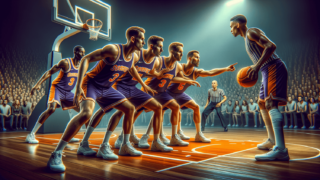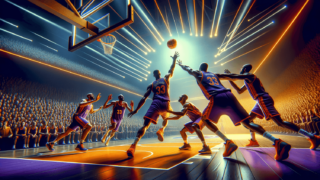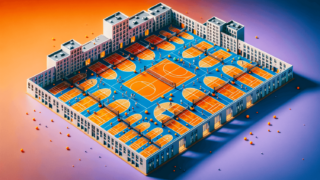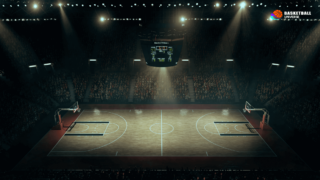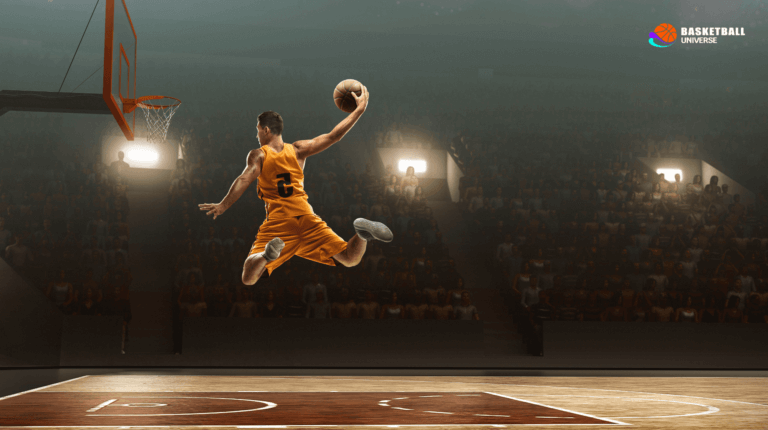
How Long Does It Take to Get Good at Basketball?
Written by: Basketball Universe
Last updated:

So, you’ve caught the basketball bug and are eager to learn how long it takes to go from benchwarmer to baller supreme? Look no further! Our latest blog post, “How Long Does It Take to Get Good at Basketball?” was written with you in mind. In this exciting deep dive, we’ll explore the ins and outs of the journey towards basketball stardom. We’ll cover everything from foundational skills and individual growth to the commitment required and the influence of various factors. Prepare to dominate the court as we unlock the secrets to transform you from a novice into a hardwood hero!
How Long Does It Take to Get Good at Basketball?
The time it takes to get good at basketball varies depending on factors like athletic ability, dedication, practice habits, coaching, and physical fitness. On average, players looking to obtain basic proficiency may require at least 1-2 years of consistent practice, while advancing to higher levels could demand ongoing commitment and focused training. Ultimately, the duration is highly individual, but a consistent program of skill development, strength conditioning, and team play will significantly accelerate improvement.
Developing Your Basketball Foundation
First things first, to truly understand how long it takes to get good at basketball, we need to lay a solid foundation for your basketball journey. This involves mastering the basics that will make up the core of your skillset. Focusing on these areas will lay the groundwork and ensure you develop a well-rounded, versatile playing style.
1. Dribbling
Basketball starts with dribbling, and mastering this skill will allow you to have better control of the ball, moving around the court more effectively. Good dribbling requires great hand-eye coordination and continuous practice. Start by focusing on the dominant hand before switching to your non-dominant hand. And remember, practice is key!
2. Shooting
Your shooting ability is critical to scoring points and becoming an offensive threat on the court. Work on proper shooting technique, including wrist flick, arm extension, and follow-through. Repetition is your best friend when it comes to developing shooting accuracy and consistency.
3. Passing
Great passing ensures your teammates get the ball when and where they need it, creating opportunities for offense. Practice chest, bounce, overhead, and one-handed passes. Incorporate good communication with your teammates to improve passing efficiency and reduce turnovers.
4. Defense
A strong defense is essential for a complete basketball player. Focus on your stance, anticipation, and footwork. Keep your eyes on your opponent and react quickly to their movements, learning to read their cues.
Fueling Your Growth with an Effective Practice Routine
Now that you have an idea of the fundamental skills needed for basketball success, it’s essential to establish a deliberate and effective practice routine. The right routine will keep you motivated, expedite growth, and solidify your skills over time. Remember, consistency is key in both skill development and physical conditioning.
1. Set Specific Goals
Setting specific, measurable, and attainable goals helps you track progress, maintain motivation, and focus on areas of improvement. Break down your long-term objectives into smaller, achievable milestones that steadily increase in difficulty.
2. Schedule Consistent Practice Sessions
Commit to a regular practice schedule, aiming for at least 30 minutes to an hour of dedicated skill work daily. Consistency builds muscle memory, making your moves more fluid and reducing the risk of injuries.
3. Drills and Scrimmages
Develop your skill set by engaging in both individual drills and team scrimmages. Drills help sharpen specific skills, while scrimmages offer opportunities to apply those skills in realistic game situations.
4. Review Your Performance
Regularly evaluate your performance through self-reflection or assistance from a coach. This can help identify areas of weakness, allowing you to adjust your practice routine accordingly and facilitate targeted growth.
Factor in Coaching, Mentorship, and Team Play
Having a strong foundation, effective practice routine, and access to great coaching or mentorship can make a significant difference in how quickly you improve in basketball. Working with knowledgeable mentors and being part of a supportive team can accelerate learning, improve motivation, and fine-tune your on-court awareness.
1. Coaching and Mentorship
A knowledgeable coach or mentor is invaluable when it comes to developing your skills and understanding of the game. They can provide personalized guidance, identify your weaknesses, and recommend appropriate drills or exercises to expedite growth.
2. Join a Team or League
Playing in a basketball team or league provides structure, competition, and myriad learning opportunities. Team play encourages communication, builds camaraderie, and fosters an environment for growth by exposing you to different playing styles and situations.
3. Summer Camps and Workshops
Attending summer camps or workshops can accelerate your development, providing intensive, focused training under the guidance of experienced coaches. These programs often have guest appearances from professional players or trainers, who can share invaluable insights and advice.
The Role of Physical Conditioning
Physical fitness plays a critical role in basketball performance. Ensuring you’re in good shape, with the strength and agility required for the game, can help you see improvements in your skills faster. Focus on a combination of strength, speed, and endurance training, as well as flexibility, for a well-rounded conditioning program.
1. Strength Training
Strength training increases your power and ability to be more aggressive on the court. This goes beyond just working out in a gym – you should incorporate specific exercises that target the muscle groups most utilized in the game, such as your legs, core, and upper body.
2. Speed and Agility Drills
Developing speed and agility is crucial for acceleration, quick changes of direction, and improving your overall game performance. Cone drills, sprints, and ladder exercises can help you become more agile and explosive on the court.
3. Endurance/Aerobic Training
Basketball demands consistent bursts of energy for an extended period. Incorporating aerobic training, such as running or cycling, in your conditioning routine will improve your endurance and stamina, ensuring you stay fresh and competitive throughout the game.
4. Flexibility and Injury Prevention
Flexibility plays a significant role in injury prevention and mobility on the court. Implementing warm-up routines, stretching, and maintaining a healthy lifestyle will keep your muscles limber and better prepared for intense physical activity.
Understand the Individuality of Growth
Everybody’s journey is different, and various factors will influence the rate of your progression in the game of basketball. These may include natural athletic ability, time commitment, dedication, coaching, physical fitness, and age. Ultimately, there is no one-size-fits-all answer, but by combining a strong foundation, effective practice routine, exposure to coaching and team play, and consistent physical conditioning, you have the formula for accelerated growth and improvement.
Exploring the Impact of Age and Experience
Age and prior sports experience can play a significant role in your basketball development timeline. Players who start young may benefit from their ability to pick up skills more easily, allowing for a quicker progression. Conversely, older players with prior sports experience could leverage their athleticism, discipline, and understanding of physical conditioning to develop skills at a faster pace.
1. Starting Young
Getting involved in basketball at a young age allows players to acquire foundational skills and develop their abilities over years. Participating in school, community, or AAU basketball programs can help in honing skills while fostering a competitive environment that propels growth.
2. Leveraging Prior Sports Experience
Players with experience in other sports may find the transition to basketball more manageable, as they can apply their developed athletic abilities and mental resilience to the new challenge. Certain sports can also build relevant movement patterns, like quick footwork and agility, that may translate well to basketball.
Strategies for Accelerating Your Progress
If you’re eager to see rapid improvement, employing certain strategies can help you accelerate your journey towards becoming a skilled basketball player.
1. Film Study
Take advantage of readily available film footage to study great players and teams, analyzing their techniques and decision-making. Observing and mimicking their moves can help you internalize successful strategies, which can then translate to your on-court performance.
2. Embrace Feedback
Seek out feedback from coaches, teammates, and even opponents, as it can shed light on areas that need improvement. Constructive criticism is central to growth, and understanding your weaknesses is the first step to addressing them.
3. Surround Yourself With Basketball
Becoming a student of the game means immersing yourself in basketball culture. Follow professional leagues, read books, listen to podcasts, or attend live games to gain a deeper insight into the game. This exposure can positively influence your mindset, focus, and drive to improve.
4. Master the Mental Game
Equally important as your physical skills is your mental toughness. Developing resilience, maintaining focus, and staying motivated play a crucial role in overcoming hurdles and driving you forward on your basketball journey. Meditate, visualize success, and set personal or team goals to help build your mental strength.
Every Basketball Journey is Unique
To sum it up, becoming good at basketball involves mastering the foundational skills, maintaining consistent practice routines, learning from coaches and teammates, incorporating physical conditioning, and understanding the impact of age and experience. How quickly these elements come together can vary greatly, so focus on your growth, and remember that each player’s timeline is unique. Embrace every step of the journey, and before you know it, you’ll find yourself dazzling on the court!
Frequently Asked Questions
Here’s a comprehensive list of questions and answers that basketball enthusiasts often ask while embarking on their journey to basketball mastery. These FAQs cover various aspects of practice, skill development, and outside factors that can lead to improvement on the court.
1. How many hours a day should I practice basketball?
Aim for at least 30 minutes to an hour of focused practice each day. As you become more serious about improving, consider incorporating additional training sessions or increasing the duration of your practice.
2. What are the essential skills I need to master in basketball?
The essential skills to master in basketball include dribbling, shooting, passing, and defense. Developing these foundational skills will enable you to become a solid all-around player.
3. Does working with a coach make a significant difference?
Yes, working with a knowledgeable coach or mentor offers personalized guidance, can identify weaknesses, and recommend targeted drills or exercises to expedite growth, making a significant difference in your basketball development.
4. Can I still improve if I start playing basketball at a later age?
Although starting young has its advantages, players of any age can still see improvement by dedicating time and effort to skill development, physical conditioning, and learning from experienced coaches and teammates.
5. How do I know if I am getting better at basketball?
Tracking your progress by setting goals, measuring performance improvements (e.g., shooting percentage or defensive skills), and periodically reviewing your performance can help you determine if you’re improving.
6. How important is physical fitness in basketball?
Physical fitness plays a critical role in basketball performance. Developing strength, speed, endurance, and flexibility can significantly impact your on-court agility, explosiveness, and durability.
7. Should I specialize in a specific position or become a versatile player?
It’s beneficial to start by developing a well-rounded skill set before specializing in a specific position. As you gain experience and identify your strengths and weaknesses, you can focus on your role on the team and hone your skills accordingly.
8. Can I become good at basketball by just playing pick-up games?
While pick-up games provide opportunities to apply skills in game-like situations, supplementing them with focused practice, drills, and team play is essential for well-rounded development and consistent improvement.
9. How do I avoid burnout while practicing?
To avoid burnout, balance structured practice sessions with rest and recovery, maintain variety in your drills, and ensure your goals remain realistic and attainable. Also, be sure to engage in activities outside of basketball to maintain mental freshness.
10. What should I focus on during the off-season?
During the off-season, focus on areas of improvement, build strength through physical conditioning, and attend basketball camps or workshops that can accelerate your development and prepare you for the next season.
11. How much do genetics and natural talent affect my basketball growth?
Genetics and natural talent can play a role, but dedicated practice, effective coaching, physical conditioning, and resilience are significant factors that contribute to your overall growth and improvement in basketball.
12. How can I work on my basketball IQ?
Improve your basketball IQ by studying game film, analyzing player movements and strategies, learning from experienced coaches, and participating in team play to better understand various roles and responsibilities on the court.
13. What role do my teammates play in my improvement?
Your teammates can impact your growth by providing feedback, collaboration opportunities, and camaraderie. Building chemistry, communication, and trust with your teammates can foster a supportive environment for collective and individual improvement.
Featured Posts
- No pillar pages found.
